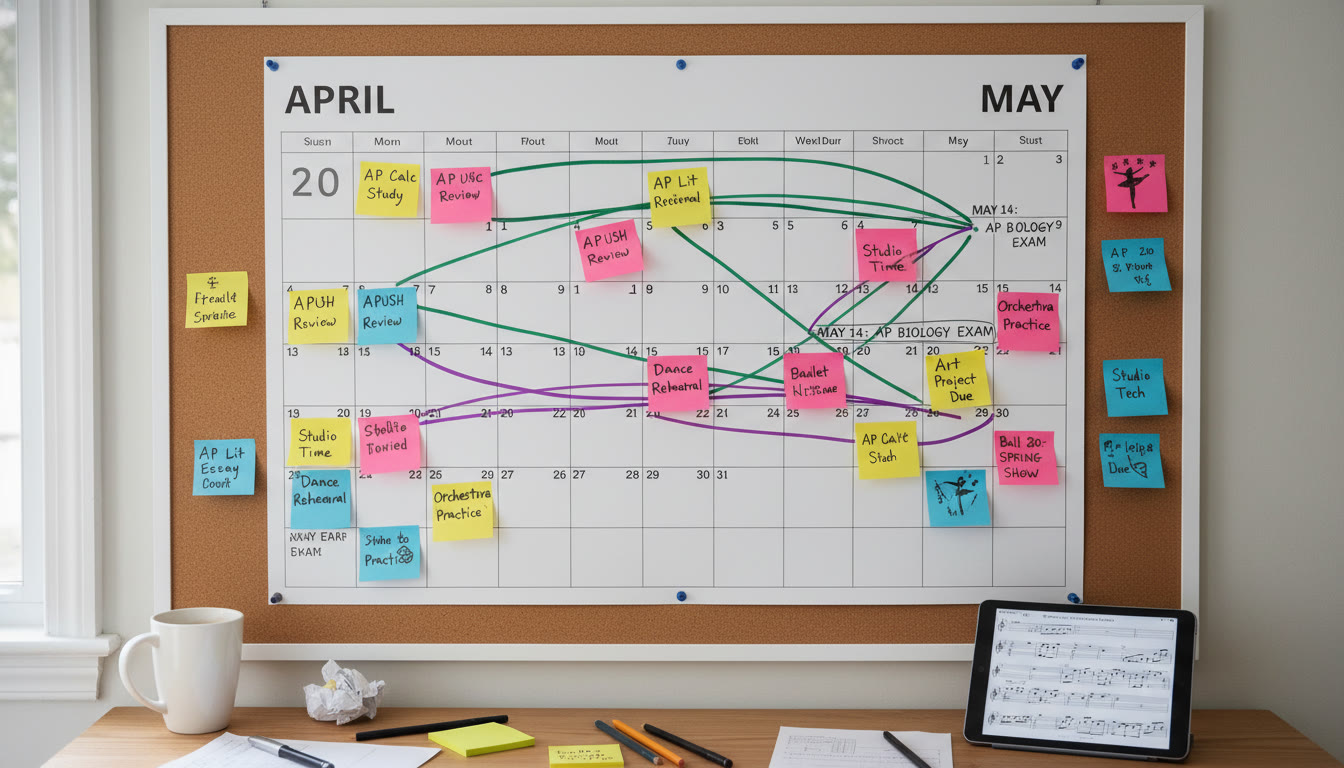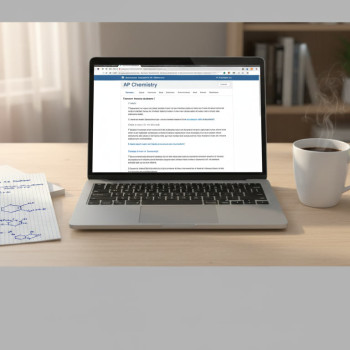Introduction: Why Performing Artists Need a Different AP Plan
Being a performing arts student is a beautiful strain on time and attention. Between after-school rehearsals, weekend tech runs, and the emotional work of performance, carving out consistent, effective study time for AP courses feels like a special kind of choreography. This blog is a practical, warm, and realistic guide to building an AP timeline that respects rehearsal schedules while keeping your scores competitive, your nervous system steady, and your love for art alive.
Understand Your Season: Map the Rehearsal Cycle First
Before you plan AP study blocks, start by mapping the performing season. Theater, choir, band, and dance programs often have predictable rhythms: auditions and casting, intensive rehearsals, tech week, performances, and possibly touring. Plot those dates first — they are immovable anchors.
Quick checklist to map your season
- List all performances, dress rehearsals, and mandatory tech days.
- Note weekly rehearsal times (even if they vary week-to-week).
- Flag high-stress windows, like competition weekends or opening week.
- Identify travel periods and any conflicts with exam dates.

AP Timeline Principles That Respect Rehearsal Demands
These principles are the backbone of any rehearsal-friendly AP timeline. They acknowledge that your time is finite but can be extremely productive when structured intentionally.
Principles at a glance
- Quality over quantity: Short, focused study sessions beat long, distracted ones.
- Micro-blocking: Use 25–45 minute blocks that fit between rehearsals.
- Priority sequencing: Tackle the hardest AP topics when you’re freshest.
- Flex windows: Reserve buffer days in the week to absorb rehearsals that run late.
- Recovery matters: Schedule at least one real rest day per week to prevent burnout.
Build Your Semester-Level Timeline: A Practical Template
Below is a semester-level template that performing arts students can adapt. It balances early content coverage, progressive practice, and late-semester review so you don’t cram during tech week.
| Timeline Phase | Weeks | Focus | Example Tasks |
|---|---|---|---|
| Foundation Build | Weeks 1–6 | Cover core units; identify weak spots | Complete unit outlines, daily micro-practice, baseline practice tests |
| Skill Deepening | Weeks 7–12 | Deliberate practice on problem types | Targeted topic reviews, problem sets, timed sections |
| Application & Mock Exams | Weeks 13–17 | Full-length practice, exam strategies | Full practice exams, scoring review, targeted correction |
| Final Polish | Weeks 18–20 | Rapid review, mental prep | Light timed practice, quick fact sheets, rest and routine |
This template assumes a roughly 20-week course to AP exam. If your school’s calendar differs, scale the phases proportionally. The golden rule: do heavier learning when rehearsals are lighter, and shift to maintenance during peak performance weeks.
Weekly Micro-Schedule: Fit AP into Rehearsal Days
A weekly micro-schedule helps you turn the semester template into day-to-day actions. The trick is to exploit short pockets — pre-rehearsal, breaks, and the hour after school.
Sample week for a student with evening rehearsals (Mon–Thu)
- Monday — 7:00–7:30 AM: Review flashcards (AP terms); 4:30–5:30 PM: Homework; 6:30–9:00 PM: Rehearsal.
- Tuesday — 3:30–4:15 PM: Focused problem set (one topic); 6:30–9:00 PM: Rehearsal.
- Wednesday — 7:00–7:30 AM: Quick reading summary; 5:00–6:00 PM: Tutoring session or group study; 6:30–9:00 PM: Rehearsal.
- Thursday — 4:00–5:00 PM: Timed practice (one section); 6:30–9:00 PM: Rehearsal.
- Friday — 3:30–5:00 PM: Longer study block (deeper concept work); evening: downtime or light review.
- Saturday — 10:00–12:00 PM: Full practice test or two timed sections; afternoon: rest.
- Sunday — Rest + 30–60 minutes of light review and planning for the week.
Micro-blocks like 25–45 minutes are easier to sustain and often more efficient than forcing a three-hour study marathon after rehearsal.
Make Rehearsal Days Revision-Effective
Rehearsal days are often mentally and physically loaded. Instead of making those days empty of study, aim for lighter, high-yield activities that maintain momentum without draining energy.
High-yield activities for rehearsal days
- Flashcards or spaced-recall tools — 10–20 minutes before bed.
- One focused practice problem that targets a known weakness.
- Listening tasks (for languages or AP Music Theory review) while commuting.
- Short, 10-minute written summaries: teach-back one concept to yourself.
Tailoring Timelines by AP Subject (Performing Arts-Friendly Strategies)
Different AP subjects demand different study approaches. Below are rehearsal-friendly tactics for some common APs taken by performing arts students.
AP English Literature & Composition
- Use performance skills: practice reading passages aloud to improve tone and comprehension.
- Focus on 6–8 canonical texts and patterns (poetic devices, character arcs).
- Schedule essay-writing drills on lower rehearsal days; do timed practice on weekends.
AP U.S. History or AP World History
- Create narrative playlists: piece events into story arcs — this is ideal for auditory learners who rehearse scenes.
- Use a weekly theme approach: one theme per week (economics, politics, culture).
AP Calculus AB / BC
- Short but frequent practice is crucial — 30 minutes every other day beats infrequent long sessions.
- Use problem-type banks and target one difficult family of problems each week.
AP Music Theory
- Integrate ear training into rehearsal warm-ups.
- Practice harmonic analysis in brief intervals between rehearsals.
Weekly Time Allocation Table: Realistic Minutes per Week
| Rehearsal Load | Study Minutes per Week (Per AP Course) | Recommended Activities |
|---|---|---|
| Low (3–5 hours/week) | 180–240 | Two 60–90 minute blocks + micro-review sessions |
| Medium (6–9 hours/week) | 120–180 | Four 30–45 minute micro-blocks + one weekend practice |
| High (10+ hours/week) | 80–140 | Daily 20–30 minute micro-practices + weekly longer session |
Adjust these numbers based on how many APs you are taking. If you’re juggling two APs and an intense rehearsal schedule, prioritize one AP for deep learning and one for maintenance early in the semester, then rotate.
How to Use Practice Tests Without Losing Rehearsal Momentum
Full practice tests are vital, but they’re also time-consuming. The key is strategic timing and post-test reflection that fits your energy.
Smart practice-test strategy
- Schedule full tests on low-rehearsal days (Saturdays are ideal).
- Use split practice if you can’t do full tests: do sections across two days and combine the score.
- After each test, spend 30–60 minutes reviewing mistakes and planning targeted practice for the following week.
Mental Health, Sleep, and Performance Energy
Performers know the value of rest better than most — voice, body, and mind all need recovery. AP prep that ignores sleep and mental health will backfire, especially during tech week.
Energy-preserving habits
- Prioritize 7–9 hours of sleep, especially before performances and exams.
- Use 5–10 minute breathing or grounding exercises between rehearsal and study to switch modes.
- Keep hydration and quick healthy snacks handy — rehearsals and study are both energy-intensive.
Personalized Help: When to Bring in a Tutor (and How Sparkl Helps)
Personalized tutoring can compress months of aimless practice into weeks of focused improvement. Consider tutoring when:
- You plateau on practice test scores after consistent effort.
- You’re juggling an unusually heavy rehearsal season with APs.
- You need help converting weak areas into efficient study plans.
Sparkl’s personalized tutoring model pairs students with expert tutors who build tailored study plans, offer 1-on-1 guidance, and use data-driven insights to focus your work. For performing students, a tutor can recommend rehearsal-friendly practice routines, help you prioritize content, and provide flexible session times that respect performance schedules.
Sample 8-Week Intensives for Performing Students
Below are two eight-week intensives you can drop into your semester depending on whether you need a foundational reset or a targeted score boost.
8-Week Foundation Reset (for early season)
- Weeks 1–2: Baseline diagnostics; set 3 core weekly goals per AP.
- Weeks 3–4: Unit mastery rotations: focus each week on one content unit per AP.
- Weeks 5–6: Mixed practice and timed sections; integrate rehearsal-friendly micro-tasks.
- Weeks 7–8: Full practice test, review, and final adjustments.
8-Week Score Sprint (late-season, before exams)
- Week 1: Full practice test and focused error tagging.
- Weeks 2–5: Targeted remediation on top 3 weaknesses.
- Weeks 6–7: Timed practice sections and pacing work.
- Week 8: Light review and mental prep; sleep and routine optimization.
Tools and Small Habits That Make a Big Difference
Small habits, consistently applied, yield disproportionate returns. Here are tools and practices that integrate well with performing schedules.
Recommended habits and tools
- Spaced-repetition flashcards (digital or paper) for short daily review.
- One-sentence daily summaries: write one sentence that captures a new idea you learned.
- Two-minute teach-backs: explain a concept to a friend or record yourself for 2 minutes.
- Calendar blocking: color-code rehearsals, classes, and study blocks so nothing overlaps unexpectedly.

Real-World Example: A Senior Balancing APs and Opening Night
Meet Maya (composite example). Maya is a senior taking AP English Literature and AP Psychology while preparing for her spring musical with rehearsals four nights a week plus weekend tech runs. She used these strategies:
- Plotted all performance dates and scaled back intensive study during tech week to short reviews only.
- Used 30-minute study blocks on rehearsal days focused on flashcards, a single practice passage, or listening to recorded lecture notes during commute.
- Booked two morning tutoring sessions per week with a Sparkl tutor for focused essay writing and psychology concept drilling.
- Saw steady improvement in practice scores and felt less anxious because her study plan was realistic and personalized.
What To Do in the Final Two Weeks Before the Exam
These last fourteen days are about consolidation, pacing, and mental readiness — not learning whole new units.
Two-week checklist
- Cut new content intake to a minimum; focus on review sheets and high-yield mistakes.
- Do one or two timed sections to maintain pacing, but avoid full exams in the last 48 hours before the test.
- Prioritize sleep and a consistent daily routine; your brain needs stabilized cues to perform under stress.
- Use breathing exercises and a short pre-exam routine to anchor nerves — treat this like pre-show ritual work.
Parent Corner: How to Support a Performing AP Student
Parents play a key role in enabling success without adding pressure. Support looks like logistical help and emotional steadiness rather than micromanagement.
Ways parents can help
- Help map calendars and keep performance and exam dates visible in a shared family calendar.
- Offer practical support: healthy meals, quiet study spaces, rides when schedules conflict.
- Be the steady voice: encourage rest days and remind students that recovery is part of preparation.
- Consider tutoring support like Sparkl if schedules or subject areas are particularly challenging.
Final Note: Keep the Art in Your Life While Aiming High
AP exams are important, and they open academic doors — but they don’t have to eclipse the joy that drew you to performance. With rehearsal-friendly timelines, targeted practice, and occasional personalized help, you can sustain creative growth while achieving academic goals. Keep your rehearsal rituals, honor your rest, and let each study block be purposeful rather than punitive. If you find yourself stuck, a tutor who understands both AP content and the rhythms of performance life can be a game-changer; Sparkl’s tutors often tailor plans to fit rehearsals, offering flexible hours and focused, data-driven strategies so you keep both your art and your scores moving forward.
Quick Takeaways
- Map your rehearsal season first; everything else bends around it.
- Use micro-blocks and spaced practice to keep progress consistent.
- Choose study tasks that match your energy on rehearsal days.
- Schedule full practice tests strategically and always review mistakes.
- Rest, sleep, and recovery are part of effective studying — prioritize them.
- If needed, use personalized tutoring to accelerate gains without sacrificing rehearsal time.
Parting encouragement
Balancing APs and performance is a tough, rewarding act. You are learning time management, discipline, and resilience — skills that will serve you well beyond exams. Plan with compassion, practice with intention, and keep making art.


















No Comments
Leave a comment Cancel